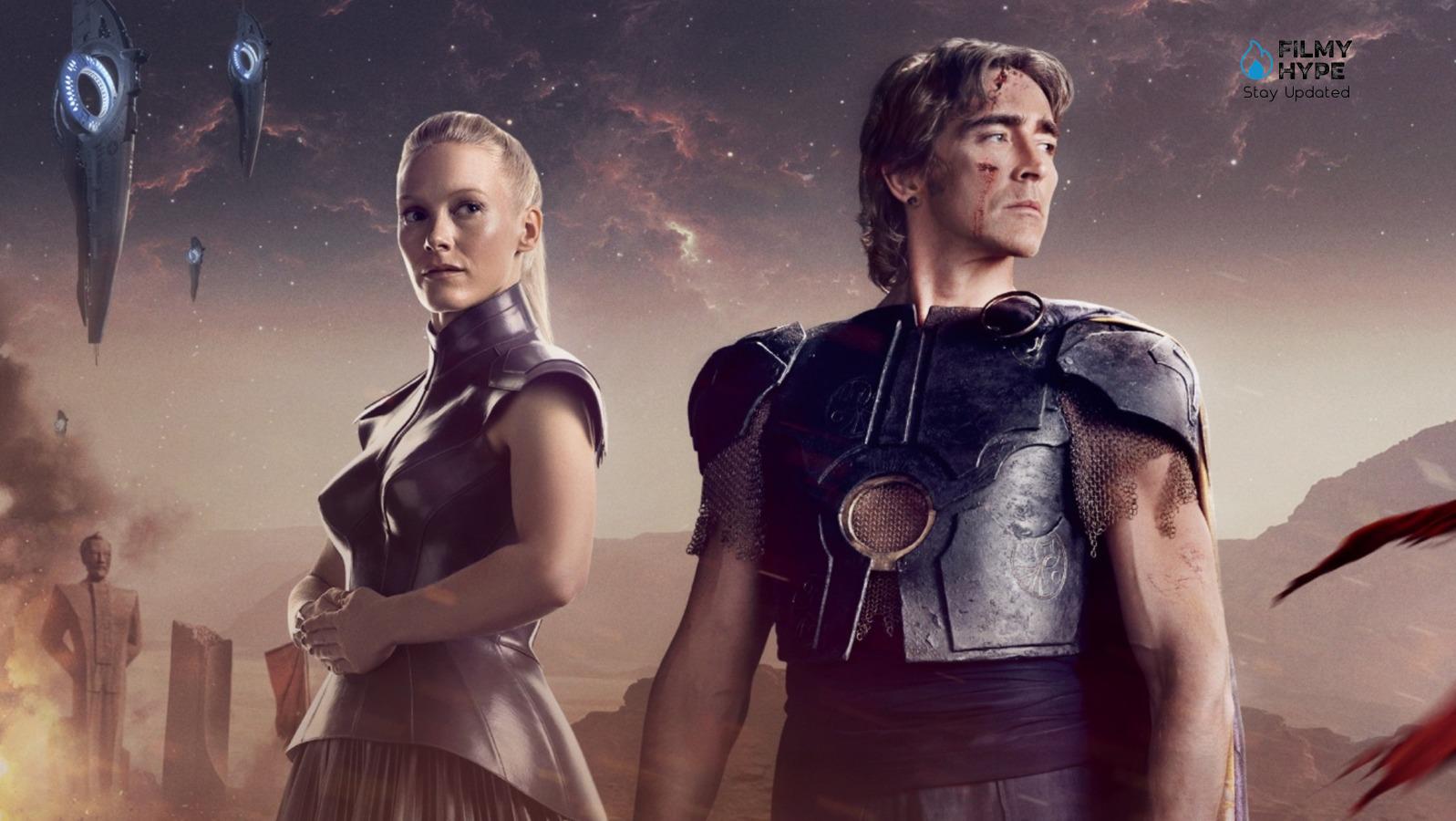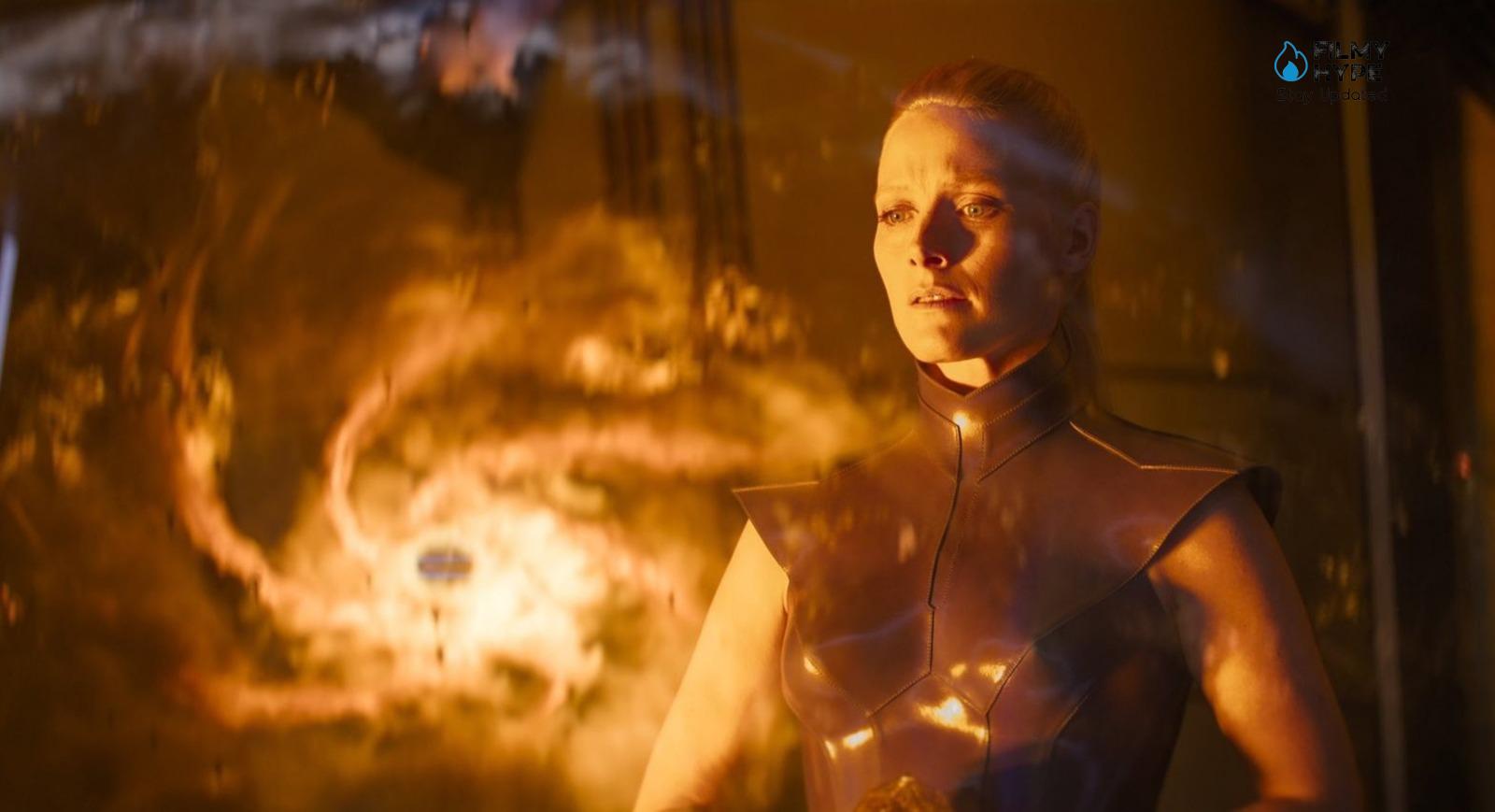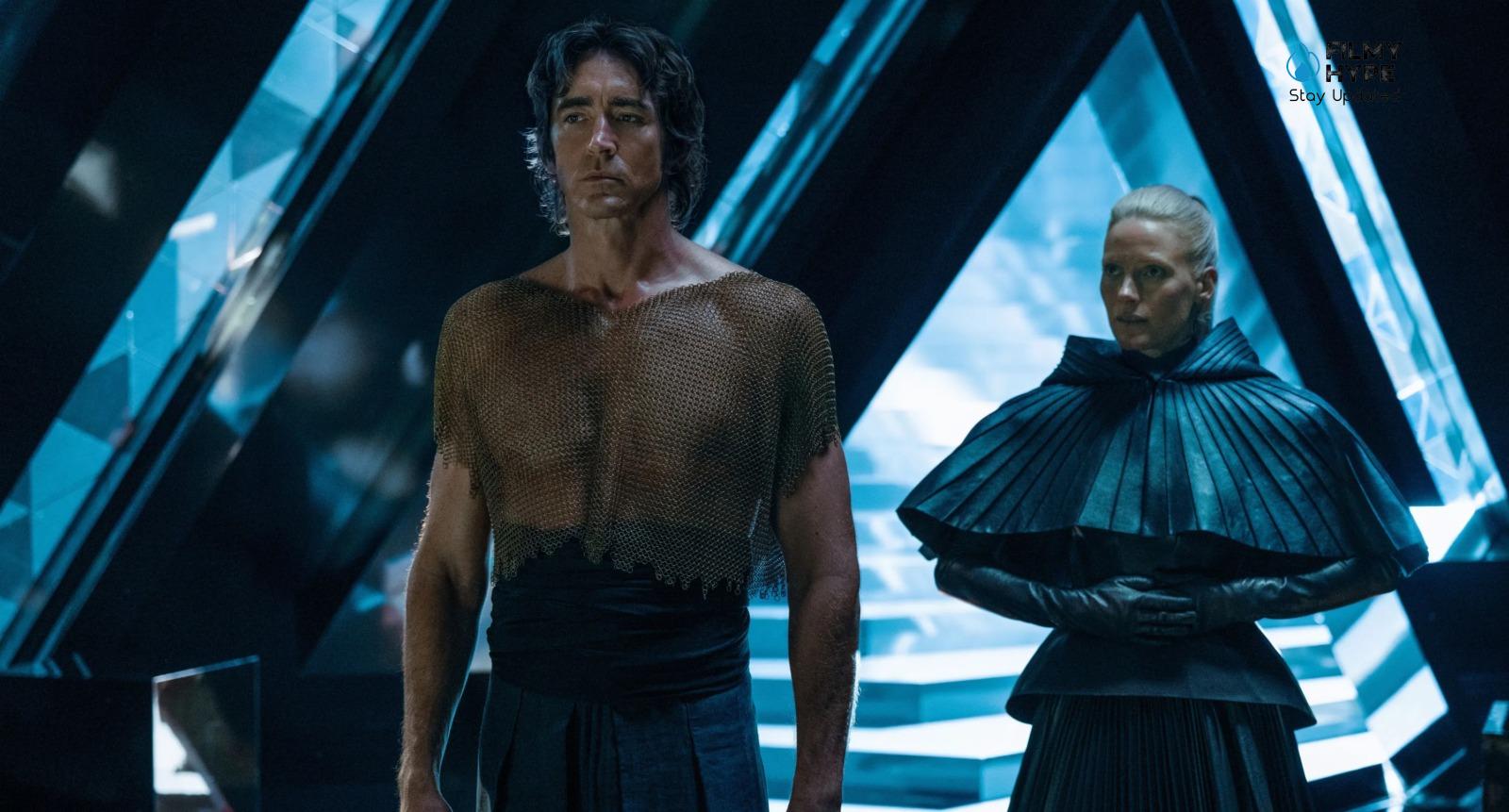Foundation Season 2 Episode 10 Review: A Continuous Overcoming of Limits | Apple TV+
Cast: Francis Terry, Holt McCallany, Rachel House, Mikael Persbrandt, Ben Daniels, Ella-Rae Smith, Nimrat Kaur, Isabella Laughland
Director: Alex Graves
Streaming Platform: Apple TV+
Filmyhype.com Ratings: 4.5/5 (four and a half stars)
Foundation Season 2 finally ended the popular Apple TV+ television series made its debut on the small screen in 2021, immediately demonstrating, despite the massive and impressive starting literary material (i.e. Isaac Asimov’s Foundation Cycle), a revolutionary foresight both on the narrative and aesthetic. However, everything was overturned with the ending, with a shocking final revelation: everything we had seen up to that moment was just a mere introduction to a more layered and complex universe. It can be said, therefore, that Foundation, in reality, has begun now, with the arrival of Season 2, finally making us participants in a more compelling and dangerous cosmic game.

After having seen all 10 of these new episodes, we come to a new and brilliant awareness: not only does the series still live up to expectations, but indeed, it reveals an artistic maturity far superior to Season 1, giving us hope for the future (although it is yet to be seen, considering the huge budget of the Skydance Television show). The work, created by David S. Goyer (Da Vinci’s Demons, The Dark Knight) and Josh Friedman (The War of the Worlds, Terminator – Dark Fate), arrived on Apple TV+ on July 14, 2023, and ended with Creation Myths episode, September 15, 2023.
Foundation Season 2 Episode 10 Review: The Story Plot
Gaal and Salvor discover that a second crisis is coming and that the galaxy is in danger. Meanwhile, Emperor Cleon decides to interrupt the genetic line of clones and get married, inaugurating a new dynasty. The news that the Foundation survived on Terminus, however, will upset every balance… On the aquatic planet Synnax, Gael – a former student of Hari Seldon – meets his daughter Salvor for the first time. Joining forces, the two women discover that not everything is going according to plan: sure, the Foundation has overcome its first crisis on the Terminus system, but the course of history is deviating catastrophically from Hari’s initial predictions. A new crisis is coming, and countless others will follow if the line traced by the brilliant mathematician is not re-established as soon as possible. Meanwhile, Hari Seldon’s digital conscience finds itself imprisoned in a bizarre virtual reality, and risks descending into madness. A revelation, however, will make him regain his reason and find a way out.

Meanwhile, on Trantor, the decline of the Galactic Empire continues unstoppable: a sect of assassins, the Blind Angels, even launches a deadly attack against Brother Giorno, alias Cleon XVII. The sovereign is about to marry the powerful queen Sareth, inaugurating a new course of history: after the rebels have contaminated the genetic purity of the Cleons, the emperor of the galaxy intends to abandon cloning and resort to traditional reproduction to inaugurate a new dynasty. However, Sunset and Dawn, Cleon’s other two clones, do not agree with this revolutionary decision, and Giorno begins to fear that they have hatched a conspiracy against him. Meanwhile, news upsets the balance of the capital: Hari Seldon’s Foundation has survived on Terminus and has joined forces with Tespis and Anacreon. Meanwhile, on the edge of the galaxy, the Foundation is now ready to wage war against the tyranny of the empire, and a message from Hari Seldon signals that the big day has finally arrived…
Foundation Season 2 Episode 10 Review And Analysis
It is often a common mistake to think that seriality has structural limits compared to cinema: indeed, in recent years there has been a clear demonstration that, in terms of quality and content, many television products easily go beyond this barrier. The Foundation itself, finally opening the doors of the cosmos in a more welcoming and inclusive way, looks to the television horizon with a very precise and coherent identity that translates, first of all, into a satisfying and self-confident aesthetic that is not afraid to show all its magnificence. This artistic fullness, implicitly, actually denotes a perfect and detailed study of the reference worldbuilding. The spectacularism and grandeur of some scenarios, as well as the breathtaking representation of deep space, would not be possible without careful and measured care in building the world of the series and in writing the background of both the characters and the settings.
A coherent and plausible universe that precisely in its geometric and mathematical arrangement (a rigor that would make Hari Seldon’s psychohistory pale) allows the technique and direction to take over by directing the camera in a detailed and surgical manner. The perfect example of this mix between artistic flashes and rationality can be glimpsed in the cosmic sequences that we see in the last episodes of Season 2, the pinnacle of an astonishing synergy that gives life to scenes that are technically flawless and simultaneously rich in meaning. The result of such aesthetic splendor is a widespread sense of belonging to a world that is external to the viewer, but which is crafted so well that it seems real. We know that art is fiction, but also an illusion, and the “artificial” universe of the Foundation, during the approximately 10 hours of viewing, temporarily becomes the spectators’ new home with all the risks and advantages that a superstructure entails.
A deep bond is therefore created between the public and the work, an indissoluble relationship that breaks only at the end of Season 2, keeping the magic intact with very few forcings and too many elements. Purists of Asimov’s work will probably have a lot to say about this, but it is also true that it was practically impossible to bring the sci-fi literary saga to the screen without any rework. Speaking precisely of narration, this happy coexistence between spectators and series is derived, without a shadow of a doubt (but not entirely) also from the excellent characterization of the characters and the management of the various events that we see represented on the screen. In addition to the figures that we have already learned about in the previous season, such as Hari Seldon (Jared Harris), Emperor Day (Lee Pace), Gaal Dornick (Lou Llobell), Salvor Hardin (Leah Harvey), the robot Eto Demerzel (Laura Birn), several really interesting new entries make the plot exciting and more human. Yes, because in these new episodes, we finally manage to see the fragility beyond the veil of Hari’s exasperating rationalism or even through the disgusting fundamentalism of the Empire.

Strange to say, but in Foundation, a series so strongly oriented towards science fiction, we rediscover much more concrete and tangible values that we feel firsthand despite being part of a world so distant from ours. The love of a daughter (or a boy), the pain of loss, the illusory nature of freedom, the power of words, and faith, are all elements very present in the Apple show which, compared to Season 1, is decidedly fuller of food for thought. Precisely because, narratively, we get to the heart of the story, with all the complexity involved between planets, characters, and situations all intertwined with each other, there is much more space to talk about sensitive themes, always very modern and current. Perhaps the most unexpected aspect is that many of these themes are conveyed by characters who, until two years ago, in terms of characterization, seemed much further away, perhaps because they were still prisoners of a narrative coldness that has now fortunately completely dissolved from these annoying and oppressive bridles.
The consequence of this is that even all the fatalism and inevitability that pervaded the entire first season has left room for greater freedom, with psychohistory which in principle predicts future events, but cannot monitor individuals. Even the imperial inaction is overturned by a sudden and controversial marriage between Giorno and Queen Sareth (Ella-Rae Smith). In short, many innovations in the script, which enrich itself in an almost suffocating and annoying way, in some episodes certainly do not shine for order and cleanliness, but on the contrary, put so many irons in the fire that it confuses the viewer. This was evident from the first two episodes, and, for a few other episodes, this sense of bewilderment remains, fortunately, for a short time. From around the fourth episode, the narrative finds the right path again, arriving at a conclusion that manages to perfectly complete all the pending paths, with a sensational season finale full of twists and turns.
Finally, applause goes to the chosen cast which, once again (and we never get bored repeating it) is of the highest level. However, if, this time, it would seem obvious to praise Lee Pace and Jared Harris again (who recovers after a somewhat out-of-place overacting in the pilot), it is right to also recognize the new talents on the field, taking the aforementioned Ella-Rae as an example Smith, who gives life to a tough and nuanced character. Furthermore, how can we not mention Ben Daniels who effectively portrays the charisma of General Bel Roise, or Dimitri Leonidas who builds Hober Mallow with conviction, often playing with the public’s trust?
This tenth and final episode of the Foundation Season 2 ends in a valley of tears and emotions. An ending that leaves numerous possible futures open and lights a beacon of hope in this increasingly cold and dark universe. Between well-placed twists, heartbreaking farewells, and a never-predictable narrative, with this last episode, the second season definitively reconfirms the expressive power of the Apple TV+ series. Foundation is, without a shadow of a doubt, one of the best shows currently on the television scene, capable of perfectly combining form and substance within a practically perfect product. Quality does not give in to compromises, remaining faithful to a trend present in almost all the TV series on the platform. In fact, to the mass production of Netflix and Disney+, Apple TV+ prefers the expensive and, unfortunately, outdated saying “few but good”, opting for productions that are perhaps less commercial but objectively superior. And if Ted Lasso, despite being a comedy, is already a very rare case, that of Fondazione is a unique case.
The complex, philosophical, and bizarre themes of the father of science fiction himself, Isaac Asimov, find in the TV series a way to be expressed without compromising the original way in which they were conceived. The television medium does not bend to the needs of the masses and is even willing to be appreciated by a few and understood by even fewer people. For this reason, as well as for objectively superior merit compared to the average of today’s serial productions, the Foundation goes beyond the boundaries of its being to become art in its essence. Directed by Alex Graves and written by David S. Goyer, the episode opens with the destruction of Terminus following Brother Giorno’s order. But the Emperor who became Tyrant has no intention of stopping the extermination here and so with a new, even more terrible order, Cleon XVII establishes his role in history. Bel Riose’s honor and Hober Mallow’s courage are all those who separate the emperor’s tantrums from the destruction of eight other innocent planets.

On Ignis, the mentalists are finally free from the yoke of Tellem Bond, but certain parasites are difficult to disinfect and Gaal will be asked to make the last, most painful sacrifice. Finally, on Trantor, every veil of illusion has now fallen and even the last invisible threads moved over the centuries by Demerzel are severed. The time of religion is over. The deities are dead and the idols are destroyed. The dark Trinity that governed the fate of the entire galaxy proved to be a triptych of false prophets and capricious rulers, insensitive to the fate of the many to achieve their own selfish goals. Even in the survival of the First Foundation, inside the Vault, it is possible to glimpse a handover from the digital copy of Hari Seldon, now deprived of his halo, to the humble hands of Constant, a true apostle of hope. A symbolic passage that also occurs in the other two cases. If, in fact, on Ignis another type of Trinity has come to free and guide the mentalists, on Trantor the tyranny of Cleon XVII is over while Demerzel returns to govern from behind the scenes.
The time of politics, therefore, becomes even more obscure because even if some illusions have fallen, others continue to persist. The Cleon dynasty resists, protected by its avenging angel whose secret remains safe in that forgotten room in the palace. The omniscient viewer knows the truth but no one else within the story can say the same. And it is a network of illusions, deceptions, and needs – positive or otherwise – that binds the various characters of the Foundation together. The mental connection between Gaal and Hari is the bond that allows the mathematician to save himself. We are not talking about just physical salvation but also an intellectual one, given that it allowed our protagonists on Ignis to remain immune to the influence of the false idol. By creating a “bridge of shared perceptions”, Gaal and Hari managed to win, albeit at a high cost.
Secrets hidden for centuries must remain so and must therefore be eradicated like weeds in a field fertilized with poison. Here then Demerzel rises above time and its incessant passing. Antagonist and martyr at the same time, the android is the only true master of his mind and conscience, showing itself as a weaver spider which, impassive, observes the other insects wriggling. Not so impassive, after all. It is still a nightingale in a gilded cage, whose song is not completely free but must sound for the pleasure of an emperor who died 600 years before. Thus, Demerzel envies and longs, with poignant emotion, for the freedom of feelings that the human beings he serves have. “Noble, thoughtful, passionate”, are the words chosen by the android to remember his Cleon I, the emperor who replaced the old iron chains with others made of diamonds and gold.
Demerzel is forced to act within the limits of the two directives that have been imposed on her: the first is to love Cleon; the second is to preserve the genetic dynasty and, thus, the status quo. The passing of centuries cannot affect her programming in any way, but there is room for interpretation. And it is precisely by leveraging these margins and that boundless love that Demerzel’s heart feels humanly, that Brother Alba and Princess Sareth manage to escape, starting a new dynasty. A parallel dynasty that could, in the future, trigger a new Crisis, or save the universe. While Demerzel holds the first Radiant in his hand and restores order to Trantor, Cleon XVII meets the end befitting an unworthy ruler like him. The plan of Hari Seldon, a scribe of psychohistory, finally prevails, pushing the emperor to use the fleet and turn his arrogance against himself. Yet it is not Seldon’s digital copy that is the hero of this story. True heroes all die to give others a future.
In the sacrifice of Bel Riose, Hober Mallow, and Salvor Hardin it is possible to feel the faint pulsation of the heart of the universe, tired but still able to love. Bel Riose was the unexpected unknown, the human variable that, once again as in the past with Raych, psychohistory could not predict. On a note of hope and love, the second season of the show ends. The future of the Foundation is optimistic: there is a parallel dynasty that could change the fate of the Empire; Hari Seldon is alive and ready to lead Gaal and the Second season Foundation given the next Crisis; Brother Constant will carry the memory of the heroes making them live forever. And the Mule? See you again in 152 years.
Foundation Season 2 Episode 10 Review: The Last Words
An amazing and colossal direction that continually challenges the limits of seriality; a very detailed and punctual script in describing characters and events, which progressively increases in quality; a dazzling photograph, perfect on a technical level; an extraordinary acting that can be seen among both the most famous and less famous actors; good quality sound and a widespread feeling of harmonious completeness, from an artistic, visual and narrative point of view which gives the viewer a credible and fascinating universe. Season 2 of Foundation flies very high, finally immersing viewers in an intricate, compelling, and nuanced galactic world, leaving nothing unresolved and indeed creating monumental expectations for the possible seasons to come.






